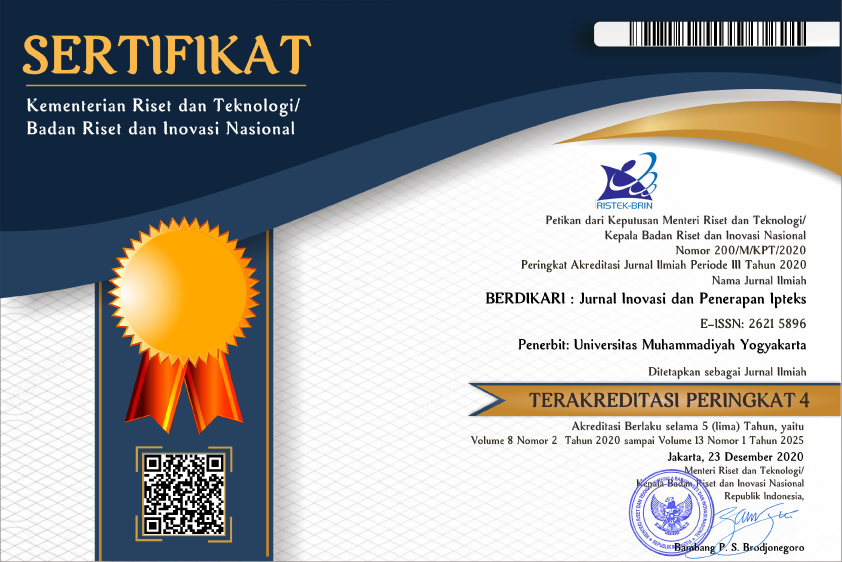Pemberdayaan Masyarakat dalam Produksi Pestisida Organik Ramah Lingkungan
DOI:
https://doi.org/10.18196/berdikari.v10i1.10972Keywords:
skills, knowledge, pesticides, farmersAbstract
The use of synthetic pesticides in farming management has had a negative impact on the environment. In general, farmers still use synthetic pesticides, hence not environmentally friendly. Therefore, farming needs to be directed towards environmentally-friendly agricultural activities with the use of organic pesticides. However, the knowledge and skills of farmers in the production of organic pesticides are lacking. The aim of this program is to increase the knowledge and skills of farmer groups in producing organic pesticides. The implementation was applied in the form of training and demonstration of pesticide manufacture. The results of the activity showed that the knowledge and skills of farmers increased, and they were able to produce organic pesticides. The implication is that farmers can produce organic pesticides independently instead of using synthetic pesticides in farm management.
References
Balai Pelatihan dan Pengembangan Pertanian. (2010). Modul Pembuatan Pestisida Organik. Balai Pelatihan dan Pengembangan Pertanian Indonesia. Jakarta
Diwanti, Dyah Pikanthi. (2018). Pengembangan Potensi Masyarakat Dusun Klajuran Melalui Pemberdayaan Pertanian Organik. Jurnal BERDIKARI, Vol.6 (1)
Estrada, A.C. dan M.G Angulo, R.B Argaez,E.R. Sanchez. (2012). Insectidal Effects of Plant Extract on Immature Whitefl Bemisia Tabacl Genn. Electronican Journal of Biotechnology Vol. 5 (10): 936-940
Hersanti. dan Santosa, E. Dono, D. (2013). Pelatihan Pembuatan Pestisida Alami Untuk Mengendalikan Hama dan Penyakit Tanaman Padi di Desa Tenjojaya dan Desa Sukamelang, Kecamatan Kasomalang, Kabupaten Subang. Jurnal Dharmakarya: Aplikasi Ipteks Untuk Masyarakat Vol.2, No. 2
Mujiyo. dan Choirul, Anam. Erlina, Wida. Suminah. (2015). Pembuatan Pestisida Organik di Ngrambe, Ngawi. Prosiding Seminar Nasional 4th UNS SME’s Summit & Awards
Pohan, Selvia Dewi. (2014). Pemanfaatan Ekstrak Tanaman Sebagai Pestisida Alami (Biopestisida) dalam pengendalian hama serangga. Alfabeta. Bandung
Supriyadi. (2013). Optimasi Pemanfaatan Beragam Jenis Pestisida Untuk Mengendalikan Hama dan Penyakit Tanaman. Jurnal Litbang Pertanian. Vol. 32 No.1 Maret 2013: 1-9
Tuhuteru, Sumiyati. Dan Anti U. Mahanani, Rein. E.Y. Rumbiak (2019). Pembuatan Pestisida Nabati Untuk Mengendalikan Hama dan Penyakit Pada Tanaman Sayuran di Distrik Siepkosi Kabupaten Jayawijaya. Jurnal Pengabdian Kepada Masyarakat Vol. 25 (3)
Windriyati, Ratna Dwi Hirma.Larin Tika Febianti. dan Gita Anggraeni. (2020) . Pembuatan Pestisida Nabati Pada Kelompok Tani Wanita Sejahtera di Desa Sikapat. Jurnal Dinamisia: Jurnal Pengabdian Kepada Masyarakat. Vo. 4 (4).
Downloads
Published
Issue
Section
License
Copyright
Authors retain copyright and grant BERDIKARI Jurnal Inovasi dan Penerapan IPTEK the right of first publication with the work simultaneously licensed under an Attribution 4.0 International (CC BY 4.0) that allows others to remix, adapt and build upon the work with an acknowledgment of the work's authorship and of the initial publication in BERDIKARI Jurnal Inovasi dan Penerapan IPTEK.
Authors are permitted to copy and redistribute the journal's published version of the work (e.g., post it to an institutional repository or publish it in a book), with an acknowledgment of its initial publication in BERDIKARI Jurnal Inovasi dan Penerapan IPTEK
License
Articles published in the BERDIKARI Jurnal Inovasi dan Penerapan IPTEK) are licensed under an Attribution 4.0 International (CC BY 4.0) license. You are free to:
- Share — copy and redistribute the material in any medium or format.
- Adapt — remix, transform, and build upon the material for any purpose, even commercially.
This license is acceptable for Free Cultural Works. The licensor cannot revoke these freedoms as long as you follow the license terms. Under the following terms:
- Attribution — You must give appropriate credit, provide a link to the license, and indicate if changes were made. You may do so in any reasonable manner, but not in any way that suggests the licensor endorses you or your use.
- No additional restrictions — You may not apply legal terms or technological measures that legally restrict others from doing anything the license permits.




